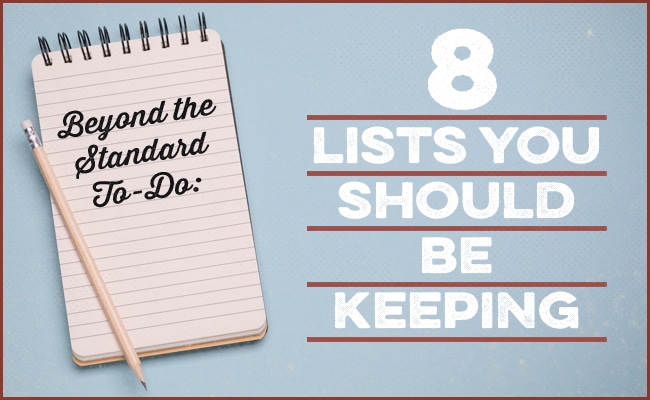
Nothing is as fatiguing as the continued hanging on of an uncompleted task. —William James
You probably keep a to-do list that compiles your outstanding chores and tasks (and hopefully treat it like a river!).
But beyond this kind of standard to-do list, there are eight other lists that are also beneficial to keep.
These lists expand the function that the standard to-do list already serves: clearing out your head and organizing your life so you can experience greater clarity and get more done.
Uncompleted tasks and unorganized thoughts — open loops — squat on your mental bandwidth. They become so much flotsam and jetsam bobbing around in your cognitive sea, sometimes sinking below the surface of consciousness, sometimes randomly rising into awareness. The fact that you don’t have a good grasp of what’s out there, and sense there are things you want to take action on but can’t remember what they are, makes you feel frazzled, fragmented, and out of sorts.
As the founder of the Getting Things Done system, David Allen, said on the AoM podcast: “Your head is a really crappy office.”
Instead of keeping all your open loops in a chaotic pile on your mental desk, file them into an external “office” by writing them down somewhere and organizing them into the following lists. You can keep these lists anywhere you like, whether in a paper or digital notebook. Their nature will make them easiest to find and access in that latter format, and while you can slot them in a well-organized “second brain,” simply using your phone’s notes app works perfectly well.
Beyond the Standard To-Do: 8 Lists You Should Keep
To Buy. You’re brushing your teeth and notice you need more toothpaste. You’re getting dressed and notice you need more socks. You’re making dinner and notice you need more pepper. You promise yourself you’ll remember these things the next time you make an Amazon order or run to the store, but, in reality, you’ve forgotten the low-inventory item five minutes later.
As soon as something you need to buy crosses your mind, write it down on a shopping list, organized by which outlet/business you’ll be purchasing it from.
To Watch/To Listen To/To Read. A co-worker mentions a show that sounds interesting. A friend sends you a podcast he recommends. Your brother suggests a book he thinks you’ll enjoy. But when you’re starting your commute to work, stepping on the treadmill to begin a run, or sitting on a plane, you can’t think of what to watch, listen to, or read. You don’t remember that a loved one gave you a good recommendation, or you do remember that they did, but can’t remember the name of the suggested movie/podcast/book.
Whether ideas for media to check out come from your social network or you stumble across them while browsing/consuming something else, write them down in separate To Watch, To Listen To, and To Read lists that you can easily cue up the next time you’re working out or washing dishes.
To Cook. You and your family have probably cooked a bunch of meals that everyone liked. But when it comes to that perennial question — “What should we have for dinner this week?” — everyone draws a blank. It’s hard to remember the meals that exist within your familial repertoire, so keep a list of them for easy reference.
To Eat. You’re driving around town, see a new restaurant that seems interesting, and make a mental note to dine there the next time you go out to eat. But by the time the weekend rolls around, the idea has evaporated from your mind. Keep a running list of restaurants to check out, so you don’t have to always default to your old standbys.
To Give. It’s your friend’s or spouse’s birthday next week, and you’re pondering what to give them as a gift. Though you rack your brain for an idea, nothing comes to mind. To prevent yourself from winding up in this pickle, write down ideas as they arise throughout the year, even if you’re months away from the occasion. The person may mention something they like, or you see an item while shopping for something else you think they’d dig. When a birthday, anniversary, or Christmas does finally roll around, you’ll only need to check your list of ideas to figure out what to get.
Another good list/note to keep is a rundown of a loved one’s favorite things — colors, foods, candies, brands — and their sizes in clothing and rings. These things are easy to forget and having a reference makes gift buying a lot easier.
To Talk About. This is a list of things to talk about with a friend, and it serves two purposes. The first is to help you remember to ask someone things you’ve been wondering about but keep forgetting to bring up. “What’s the latest on your lawsuit?” “Have you heard from Andy?” “Did you ever figure out what was causing that noise?” The second purpose is to enhance the conversation you have with someone the next time you get together. While it’s often supposed that it’s best to keep social interactions strictly spontaneous, a little intentional planning on the backend can actually make interactions much smoother, deeper, and more enjoyable. Before you get together with someone, make a list of questions you’d like to ask and good conversation topics to discuss.
You may, of course, want to make other lists based on your particular responsibilities and interests. For example, when we hear about a new trail, we add it to our “To Hike” list.
Move whatever things you can out of the crappy office that is your cranium and to an external file. The more lists you keep, the more organized you’ll feel and the more enjoyable, life-enriching action you’ll take.







